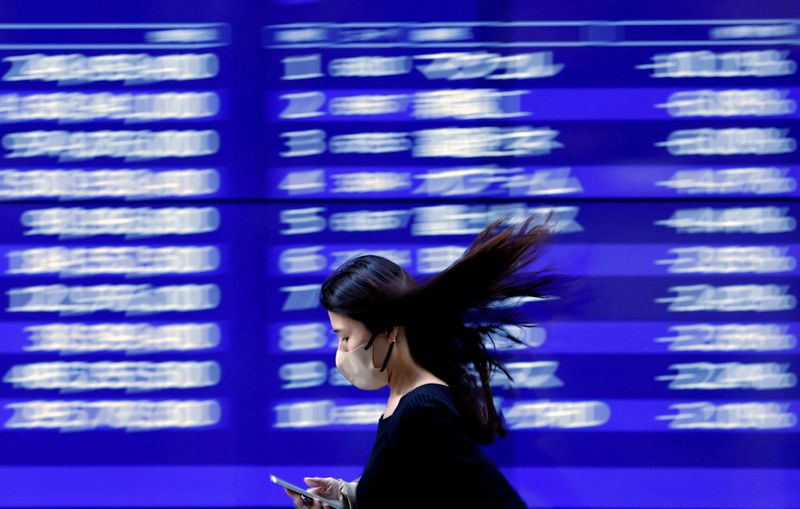By Jamie McGeever
ORLANDO, Florida (Reuters) - Long Japan, short China.
If there is a general macro, relative value trade playing out right now, it might be that as the contrasting fortunes of Asia's economic and financial behemoths become starker by the day.
China's economy is rapidly losing steam and investor appetite for Chinese assets is cooling accordingly, while Japan's growth is accelerating and its main stock markets are at or flirting with their highest levels in 33 years.
Some of these trends are not new - overseas investors have been selling Chinese bonds for over a year and deteriorating U.S.-China relations have hung over investors for just as long - but they have been brought into sharp focus by deeply divergent economic indicators this week.
First up, Chinese investment and retail sales in April fell short of economists' forecasts, industrial production growth was barely half what economists had predicted, and foreign direct investment growth was less than half of that in March.
Hot on the heels of data the week before that showed inflation and imports collapsed in April, China's economic surprises index on Tuesday registered its biggest fall in two years and one of the steepest ever.
The growth outlook has darkened quickly and considerably - Barclays (LON:BARC) economists on Wednesday slashed their second-quarter GDP forecast to 1% from 5%, and the full-year outlook to 5.3%. Even Beijing's official 2023 goal of 5% would be the lowest in over 30 years, excluding the pandemic-driven turmoil of 2020.
Analysts at Societe Generale (OTC:SCGLY) on Wednesday revised their outlook on the yuan, and now see it falling to 7.30 per dollar this year - a level flirting with 15-year lows.
ON TOPIX
Official figures from Japan on Wednesday, meanwhile, showed that Asia's second-largest economy grew in the first quarter four times faster than expected on a quarterly basis at 0.4%, and more than twice as fast on an annualized measure at 1.6%.
Also this week, Japan's benchmark Nikkei 225 stock market index closed above the psychologically important 30,000 point mark for the first time in 20 months, and is now within a few percent of levels it last reached in 1990.
The broader Topix index hit a 33-year high on Tuesday.
Foreign investors have been net buyers of Japanese stocks for five weeks, but cumulative flows are only back to where they were last summer, according to Goldman Sachs (NYSE:GS) analysts.
There's plenty scope for further buying.
"A longer timeframe shows that foreign investors have been net sellers of Japanese equities by a considerable margin. We think long-term investors remain lightly positioned," they wrote last week in a note "Upside risks in Japanese equities".
Bank of America (NYSE:BAC)'s latest fund manager survey paints a similar picture. A net 11% of those polled are underweight Japanese stocks, 0.7 standard deviation below the long-term average.
CHINA CRISIS?
Compare that to China.
Granted, net buying of Chinese equities by foreign investors earlier this year approached $30 billion, but the bulk of that was in January when COVID-19 restrictions were scrapped and markets surged.
But that burst of optimism surrounding the post-COVID reopening has evaporated. Non-residents sold nearly $4 billion of Chinese stocks in April, according to the Institute of International Finance, the first outflow in six months.
Bank of America's monthly fund manager surveys show that "long" Chinese equities was the most crowded global trade in January. That has been scaled back significantly and investors have reduced their net overweight position in Chinese stocks, but they are still comfortably net overweight.
If there is scope for investors to increase their exposure to Japanese equities further, there's scope for them to further reduce their exposure to China.
Bond investors, meanwhile, have been voting with their feet. A decade of strong and steady inflows into Chinese debt securities reversed when Russia invaded Ukraine in February last year, and foreigners show no sign of being tempted back.
The next steps from Bank of Japan (BOJ) and People's Bank of China (PBOC) could help cement these trends too.
If the BOJ starts dismantling its "yield curve control" policy soon to bring inflation down, perhaps as early as next month, the yen would likely rise and Japanese investor flows could shift back to domestic assets.
The PBOC faces a tougher job attracting investors to China given the fragile growth picture and geopolitical tensions surrounding Taiwan, Ukraine, tech espionage and sanctions.
The upcoming Group of Seven leaders' summit in Japan will address these issues, and the joint communique is likely to have a section devoted to China. But it remains to be seen how direct the language will be. Japan and Germany are major exporters to China and may be skeptical about signing on to controls on investment into the world's second largest economy.

Investors, however, are making their positions pretty clear.
(The opinions expressed here are those of the author, a columnist for Reuters.)
(By Jamie McGeever; Editing by Jamie Freed)